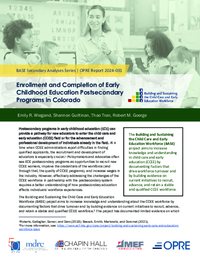Enrollment and Completion of Early Childhood Education Postsecondary Programs in Colorado

Postsecondary programs in early childhood education (ECE) can provide a pathway for new educators to enter the child care and early education (CCEE) field or for the advancement and professional development of individuals already in the field. At a time when CCEE administrators report difficulties in finding qualified applicants, the recruitment and development of educators is especially crucial. Policymakers and advocates often see ECE postsecondary programs as opportunities to recruit new CCEE workers, improve the credentials of the workforce (and thereby the quality of CCEE programs), and increase wages in the industry. However, effectively addressing the challenges of the CCEE workforce in partnership with the postsecondary system requires a better understanding of how postsecondary education affects individuals’ workforce experiences.
The Building and Sustaining the Child Care and Early Education Workforce (BASE) project aims to increase knowledge and understanding about the CCEE workforce by documenting factors that drive turnover and by building evidence on current initiatives to recruit, advance, and retain a stable and qualified CCEE workforce. The project has documented limited evidence on which strategies increase retention and recruitment and which strategies work best for different types of teachers and in different settings. There are also important gaps in knowledge about how teachers enter, stay in, and exit the field, owing to a lack of data that tracks individuals over time. Gaps in the knowledge base include how individuals proceed through the workforce, how they attain credentials, and the impact of strategies to expand credential attainment. A better understanding of students in postsecondary ECE programs and their education and labor force trajectories is directly relevant to the design of effective and equitable strategies that prioritize the recruitment of highly trained teachers and the ongoing professional development of the existing workforce.
This brief explores how individual-level administrative records linked across multiple state agencies can be used to observe individuals’ pathways through ECE postsecondary programs, with the goal of understanding how ECE postsecondary enrollment complements work experience in developing the CCEE workforce. Using administrative data from the Linked Information Network of Colorado, the analysis explores the demographic characteristics and prior employment experiences of newly enrolled students in ECE bachelor’s degree programs, and in associate’s degree and comparable certificate programs in Colorado. Following these students over several years, the analysis reports on their graduation rates and post-graduation employment and wages.
This brief demonstrates both the possibilities and the challenges in examining these questions using linked data. Key findings include:
- Across ECE postsecondary programs in Colorado, the racial and ethnic distribution of the students matched the state’s overall workforce.
- Students in ECE associate’s degree programs and comparable certificate programs in Colorado were generally older and had prior work experience in CCEE compared with students in bachelor’s degree programs.
- Only 8 percent of Colorado students enrolled in ECE associate’s degree or certificate programs of similar length had completed one of those credentials within three years. Another 9 percent completed an ECE certificate requiring less than one year of credits. Of the 8 percent of students completing an ECE associate’s degree or comparable certificate, a little over half were working in CCEE one year after earning their degrees, with a median annualized wage of $28,702.
- Some 21 percent of those enrolled in ECE bachelor’s degree programs in Colorado graduated on time (within four years), and 43 percent graduated within six years. About three in four ECE bachelor’s degree graduates were working in CCEE one year after graduation, with a median annualized wage of $32,620.
Document Details
Wiegand, Emily R., Shannon Guiltinan, Thao Tran, Robert M. Goerge (2024). Enrollment and Completion of Early Childhood Education Postsecondary Programs in Colorado. OPRE Report 2024-031. Washington, DC: Office of Planning, Research, and Evaluation, Administration for Children and Families, U.S. Department of Health and Human Services.






